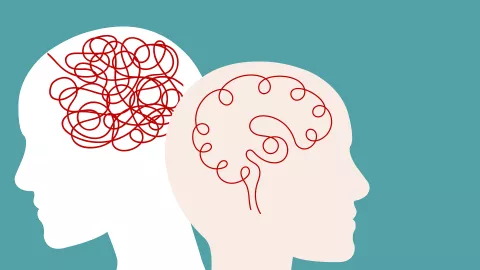Awareness of support services and information resources for individuals with mental illnesses
Understanding Mental Illnesses and Their Impact
Mental illnesses encompass a diverse range of conditions that affect a person’s thoughts, emotions, and behaviors. These disorders can significantly impact an individual’s daily functioning, relationships, and overall quality of life. It is essential to recognize that mental illnesses are medical conditions that can arise from a combination of genetic, biological, environmental, and psychological factors.
The impact of mental illnesses extends beyond the individual to their family, friends, and broader community. Stigma and misconceptions surrounding mental health can lead to discrimination and prevent individuals from seeking the help they need. By understanding the complexities of mental illnesses and their far-reaching effects, we can work towards creating a more supportive and inclusive society for everyone.
Identifying Signs and Symptoms of Mental Illnesses
Mental illnesses can manifest themselves in various ways, often presenting a range of signs and symptoms that impact an individual’s thoughts, feelings, and behavior. One common indicator is a noticeable change in mood, such as persistent feelings of sadness, anxiety, or irritability that interfere with daily functioning. Additionally, extreme mood swings, sudden outbursts, or unusually intense reactions to situations may point to underlying mental health issues.
Physical manifestations of mental illness can also be observed, including changes in sleep patterns, appetite, or energy levels. Unexplained aches and pains, frequent headaches, or digestive problems that are not attributed to a known physical condition could be red flags for psychological distress. Moreover, cognitive symptoms like difficulty concentrating, memory problems, or racing thoughts can indicate the presence of a mental health disorder that warrants attention and support.
Exploring Available Support Services for Mental Health
Support services for mental health are essential resources that aim to provide assistance and care for individuals experiencing various mental health challenges. These services include counseling centers, community mental health clinics, support groups, and helplines staffed by trained professionals. Counseling centers offer therapeutic interventions and support tailored to individuals’ specific needs, helping them cope with challenges and develop strategies for mental well-being. Community mental health clinics provide comprehensive services, including therapy, medication management, and case management, to individuals with mental health disorders, ensuring holistic care and support.
Additionally, support groups offer a platform for individuals to connect with others facing similar struggles, fostering a sense of community and understanding. These groups provide a space for members to share experiences, gain insight, and receive emotional support in a non-judgmental environment. Helplines staffed by trained professionals offer immediate support and guidance to individuals in crisis or needing help, ensuring timely interventions and access to resources for mental health support. By exploring and utilizing these available support services, individuals can enhance their mental well-being and access the assistance needed to navigate their mental health challenges effectively.
Accessing Crisis Hotlines and Emergency Services
In times of crisis, it is vital to know how to access immediate help and support. Emergency services, such as 911 in the United States or 999 in the United Kingdom, should be contacted for any life-threatening situations or instances requiring urgent medical assistance. These services are equipped to handle emergencies and dispatch the necessary resources to provide swift intervention.
For individuals experiencing a mental health crisis, contacting a crisis hotline can offer immediate support and guidance. Crisis hotlines are staffed by trained professionals who can provide confidential assistance and help individuals navigate through difficult situations. These hotlines are available 24/7, offering a lifeline to those in distress and in need of emotional support.
Utilizing Online Resources for Mental Health Information
With the advent of technology, accessing information on mental health has become more convenient through online resources. These platforms offer a wide range of articles, videos, and forums dedicated to providing information on various mental health conditions, treatment options, and coping strategies. By utilizing these resources, individuals can educate themselves about mental illnesses, understand their symptoms, and learn how to seek help effectively.
Online resources also play a crucial role in promoting mental health awareness and reducing stigma surrounding mental illnesses. Through informative websites and social media campaigns, people can engage in discussions about mental health, share personal experiences, and offer support to those in need. Additionally, online platforms often provide links to reputable mental health organizations, hotlines, and resources for further assistance. By harnessing the power of online resources, individuals can empower themselves with knowledge and take proactive steps towards improving their mental well-being.
Benefits of Seeking Professional Help for Mental Illness
Seeking professional help for mental illness can greatly benefit individuals struggling with their mental health. One of the main advantages of professional intervention is the access to specialized expertise that can provide accurate diagnosis and effective treatment plans tailored to each individual’s unique needs. Mental health professionals, such as psychiatrists, psychologists, and therapists, have the knowledge and experience to offer evidence-based therapies and medications that can help manage symptoms and improve overall well-being.
Moreover, seeking professional help for mental illness can offer a safe and supportive environment for individuals to express their thoughts and feelings without fear of judgment. Therapeutic sessions provide a non-judgmental space where individuals can explore their emotions, thoughts, and behaviors, leading to greater self-awareness and understanding of their mental health issues. Through regular appointments with mental health professionals, individuals can develop coping strategies, build resilience, and work towards a path of recovery and improved quality of life.
Navigating the Mental Health Care System
The mental health care system can be complex and daunting to navigate for individuals seeking support and treatment. Understanding the process of accessing mental health services is crucial for obtaining the care needed. Initially, it is essential to research and identify potential mental health providers, such as psychiatrists, psychologists, therapists, or counselors, who specialize in treating the specific mental health concerns being addressed.
Appointments can be scheduled by contacting the mental health provider directly or through a referral from a primary care physician. It is advisable to inquire about the provider’s expertise, treatment approaches, availability, and insurance coverage accepted prior to the appointment. Before the initial consultation, preparing a list of questions and concerns can help in facilitating a productive discussion regarding treatment options and care plans. Additionally, familiarizing oneself with the mental health care provider’s policies on confidentiality, treatment goals, and duration of therapy can aid in establishing a collaborative and effective therapeutic relationship.
Support Groups and Peer Counseling for Mental Health
Support groups and peer counseling provide a valuable source of support for individuals struggling with mental health challenges. These groups offer a safe and non-judgmental space where individuals can share their experiences, receive empathy, and gain insights from others facing similar struggles. Through group discussions and interactions, participants can feel validated in their feelings and experiences, reducing feelings of isolation and loneliness often associated with mental illnesses.
Peer counseling, which involves individuals providing support and guidance to each other based on their shared experiences, can offer a unique perspective and understanding that may not always be present in professional settings. Peer counselors offer empathy, encouragement, and practical advice to help individuals cope with their challenges and work towards recovery. The peer-led approach can empower individuals to take an active role in managing their mental health, promoting a sense of ownership and resilience in their journey towards well-being.
Importance of Self-care and Coping Strategies
Self-care and coping strategies play a crucial role in managing mental health challenges. Engaging in activities that promote self-care, such as physical exercise, adequate rest, and healthy eating habits, can help individuals maintain overall well-being. Coping strategies, including mindfulness techniques, relaxation exercises, and seeking social support, are valuable tools in navigating periods of stress or emotional turmoil.
Taking time to prioritize self-care allows individuals to recharge and build resilience in the face of life’s various stressors. By cultivating healthy coping mechanisms, individuals can develop a strong foundation for managing their mental health and reducing the impact of potential triggers. It is essential for individuals to recognize the significance of self-care and coping strategies in their mental health journey, as these practices contribute to overall stability and well-being.
Promoting Mental Health Awareness in Communities
Creating awareness about mental health in communities is crucial in breaking down stigmas and promoting understanding of these conditions. Education plays a vital role in dispelling misconceptions and fostering empathy towards individuals struggling with mental illnesses. By organizing workshops, seminars, and informational campaigns, communities can empower their members to recognize the signs of mental health issues and seek appropriate support when needed.
Engaging with local schools, workplaces, and community centers can also aid in promoting mental health awareness. Implementing mental health literacy programs and destigmatizing conversations around mental well-being can help normalize seeking help for psychological challenges. By fostering a culture of acceptance and support, communities can play a vital role in enhancing the mental health outcomes of their residents.
Addressing Stigma and Discrimination Against Mental Illness
Stigma and discrimination surrounding mental illness remain prevalent issues in society, often leading to negative attitudes and misconceptions towards individuals experiencing such conditions. These societal attitudes can create barriers to seeking help and can perpetuate feelings of shame and isolation among those affected. It is crucial to address and challenge these stigmas to promote understanding, acceptance, and support for individuals struggling with mental health challenges.
Educating the public about mental health and actively challenging stereotypes and prejudices are essential steps in combating stigma and discrimination. By fostering open conversations and increasing awareness, we can create a more inclusive and empathetic environment for individuals with mental illnesses. It is important to recognize that mental health conditions are common and treatable, and that everyone deserves to be treated with respect, compassion, and dignity, regardless of their mental health status.
Advocacy and Policy Initiatives for Mental Health Support
Advocacy efforts for mental health support encompass a broad spectrum of activities aimed at promoting awareness, driving policy change, and securing resources for individuals grappling with mental health challenges. These initiatives are crucial in advocating for the rights of those affected by mental illnesses, ensuring access to quality care, and combating stigma and discrimination. By engaging in advocacy work, individuals and organizations can contribute to shaping public perceptions, influencing decision-makers, and ultimately fostering a more supportive environment for those in need of mental health services.
In parallel, policy initiatives play a pivotal role in structuring the provision of mental health care, establishing guidelines for treatment protocols, and allocating resources to support mental wellness programs. Effective mental health policies are essential for defining the standards of care, improving service delivery systems, and prioritizing mental health as a public health issue. By advocating for evidence-based policies that prioritize prevention, early intervention, and holistic approaches to mental health care, stakeholders can work towards creating a more inclusive and responsive mental health support system.
Empowering Individuals with Mental Illness to Seek Help
Encouraging individuals struggling with mental illness to seek help is crucial in ensuring their well-being and overall mental health. Acknowledging the importance of seeking professional assistance can be a significant step towards managing mental health conditions effectively. By accessing appropriate support services and resources, individuals can gain the necessary tools and guidance to navigate through their challenges and work towards recovery.
Empowerment lies in the acknowledgment of one’s struggles and the proactive steps taken to address them. Through education and awareness, individuals can better understand their own mental health needs and advocate for themselves within the healthcare system. Seeking help not only promotes personal growth and resilience but also fosters a supportive environment where individuals feel validated and understood in their journey towards mental wellness.







